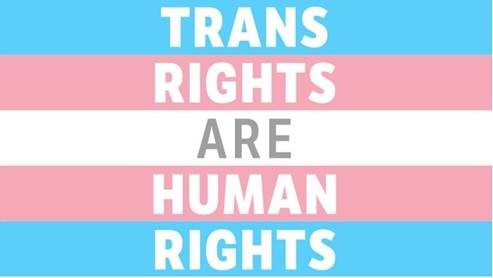The article below has been written by Dr. Margaret Prior from Plymouth Business School (PBS).
Trans rights are human rights!
Recent months have seen increasing media coverage and social media commentary on the issues around gender reassignment and trans rights. The so-called ‘debate’ has focused on wild assumptions with little or no basis in fact and some aspects of it are extremely toxic. Rather than rehash elements of that ‘debate’ it’s useful to look at the facts about trans people in the UK today.
About 1% of the population are trans or non-binary. A trans person is somebody who identifies as a gender which does not align with their sex and a non-binary person doesn’t identify as either gender. To clarify, sex is a biological attribute: babies are assigned a sex – male or female – at birth. Gender, on the other hand, is a socially constructed attribute relating to the way we feel about ourselves and the things that are expected of us: that is, gender is something we perform. In short, then, about 1% of people feel that their gender does not match the sex they were assigned.
Trans people are therefore a very small minority of the population. As such, they experience vast amounts of misunderstanding, harassment, discrimination and hatred. For instance:
- About two in five trans people are on the receiving end of hate crime every year
- One in eight trans people have been physically attacked by colleagues or customers at work
- Around 40% of trans people have attempted to take their own lives
Moreover, about one in three employers have admitted that they are unlikely to give a job to a trans person. Not surprisingly, then, up to half of all trans people hide their identity at work because they fear they will be discriminated against – but this secrecy has massive implications for their health and wellbeing.
There is some protection for trans people under the Equality Act 2010. The protected characteristic is gender reassignment, where an individual is proposing to transition, is transitioning or has transitioned. In this context, reassigning gender does not have to include undergoing specific medical treatment or surgery: many trans people do not wish to do this. However, the protected characteristic is still quite narrow, excluding people who identify as non-binary or those who are intersex (born with the physical characteristics of both male and female). The Women and Equalities Select Committee is just one of the bodies calling for an amendment to the Equality Act such that gender identity, rather than just gender reassignment, is the protected characteristic.
Meanwhile, everybody at the University of Plymouth is covered by a comprehensive Trans Policy which aims to raise awareness of gender identity issues and ensure that trans, non-binary and gender fluid (or gender queer) staff and students do not experience discrimination, harassment or victimisation. The policy addresses practical considerations, such as the provision of gender neutral uniforms and toilet facilities, as well as confidentiality for trans staff and students, training for all employees and the processes involved in changing names on staff and student records, including degree certificates. The complete policy can be found here.
For further information about trans issues, see the Stonewall Q&A The truth about trans. The training course Transgender Awareness, delivered by the Diversity Trust, is also highly recommended: places can be booked in the usual way through Employee Self-Service.
Dr Margaret Prior (she/her)
Lecturer in HRM


